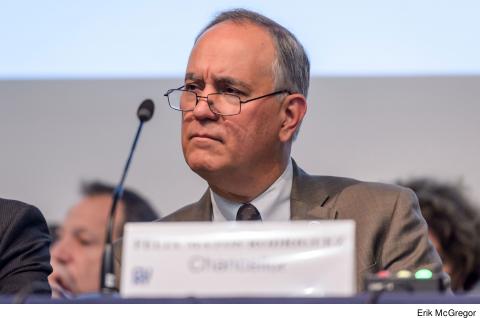‘Chancellor’s actions are illegal’
 |
The fight to have PSC members paid what they are owed continues.
Last November, Chancellor Félix Matos Rodríguez ruined the holidays for CUNY faculty and staff when he told the union that the university would ignore its contractual obligation to implement a 2% raise for everyone in the bargaining unit. The union vowed to fight.
On February 19, the union made its case against CUNY before a university hearing officer regarding its mass grievance concerning the raise. Renée Lasher, the PSC’s director of contract administration, did not mince words when she said in her statement before the hearing officer that the chancellor had failed in his most basic duty of adhering to the union and the university’s collective bargaining agreement.
NOT SUGGESTIONS
“Once these terms are bargained and signed, they are not a suggestion, they are not optional, they are not subject to the whims and vagaries of the parties, they are legally binding obligations,” Lasher said. “This isn’t news, not to anyone here, and not to the chancellor. The chancellor understands his obligation to pay what the contract says is going to be paid, but his actions reveal his disdain for his legal obligation, the contract and his employees. The chancellor made the assessment that he wouldn’t be held accountable in any way that mattered to him, so he chose to disregard his obligations to his employees.”
And, Lasher said, is that the administration’s justification for delaying the contractual raise was the fiscal uncertainty caused by the state’s decision to withhold 20% of state funding to the university. But that excuse doesn’t hold water, she said.
“CUNY had access to over $118 million for institutional needs from the CARES Act passed at the end of March 2020, but didn’t seem to feel any urgent need to use it,” Lasher said. “To date, the status of that money is being guarded like a corporate secret. The CARES Act award to CUNY … was a total of almost $251 million. Roughly $118 million was earmarked specifically for aid to students; the balance could be used more broadly to support employees as well as students, and meet other institutional needs created by the pandemic.”
She continued, “More recently, on December 27, a second much larger aid package was passed, allocating an additional $118.4 million earmarked for student aid to CUNY colleges, and an additional $336.7 million to CUNY colleges for institutional needs. This means that CUNY will have a total of $455 million for institutional needs, but again, CUNY’s plans for these funds are hidden.”
OTHER UNIONS FIGHTING
The PSC isn’t the only union fighting this battle – last year, several state unions reported that the state was delaying negotiated wage increases. The Times-Union in Albany reported that workers whose unions bargain directly with the governor may not see raises implemented until 2023 unless the state receives more federal aid.
The New York Daily News reported that the Metropolitan Transportation Authority was considering freezing wages until at least 2024, prompting Transport Workers Union President John Samuelsen to say workers would be so “upset by the rescinded raises that they’d likely begin to disrupt mass transit service on their own.” The Empire Center for Public Policy, an anti-union think tank, complained that the state’s pay freezes weren’t extreme enough, suggesting that the legislature freeze all state and local government worker pay.
The United University Professions (UUP), which represents SUNY faculty and staff, has joined the PSC in calling on the New York State Legislature to adopt new tax revenue bills to fund services and address budget shortfalls.
“Last year, UUP filed class action grievances covering the delayed raises as well as delays in implementing increases in minimum salaries scheduled to take effect in 2020,” UUP spokesperson Mike Lisi told Clarion. “These include minimum salaries for adjuncts. UUP also filed an improper practice charge with the NYS Public Employment Relations Board (PERB) on behalf of residents working in facilities associated with SUNY’s academic medical centers.”
CUNY’s lawyers offered little defense of the chancellor’s action in the hearing, other than to say that because the administration has vowed that the raise will be implemented eventually with backpay, there was no need to apply interest as well. PSC President Barbara Bowen called on the CUNY hearing officer, Eric Carr, to rule in favor of the union.
Bowen said that the fight for the raise is also an ongoing fight in Albany, where she has been speaking to state lawmakers about using new federal monies to fund contractual raises.
“Now that there is more than $12 billion coming into the state from the federal government, it is an absolute priority that we restore these wages,” Bowen said. “This fight is not just about a grievance – it’s a budget fight.”
BROAD ISSUE
Bowen pointed out that the law requires the union to go through the grievance procedure before filing a lawsuit.
It is likely that the grievance will eventually be settled in arbitration. For the union, the grievance is not just about the chancellor’s violation of the contract.
“The chancellor’s actions are immoral, illegal, unethical and unsupportable,” Lasher said. “This kind of casual disregard of legal obligation, dismissal of the less powerful, and refusal of personal accountability might be considered normal in Washington, DC, and on Wall Street, but I never would have expected it to be taken up by CUNY.”

